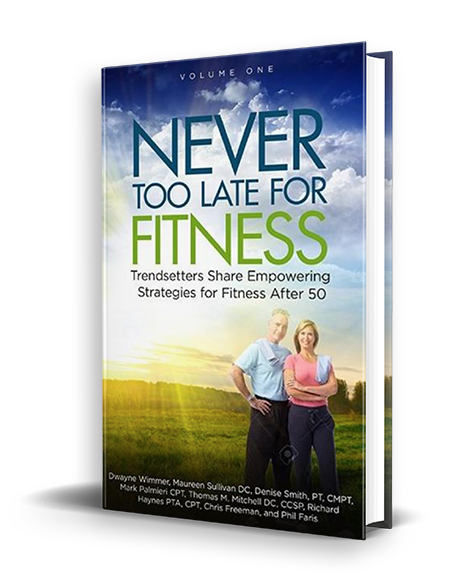“Never Too Late for Fitness (Volume One)” is a collaborative book series featuring leading health and fitness professionals from across the country who are passionate and committed to helping people over 50 get fit, stay fit and live longer, healthier and happier lives.
In this edition, Phil Faris has conversations with the fitness trendsetter, Thomas M. Mitchell, D.C.,CCSP.

Phil Faris: No matter how good the program is, everyone runs into obstacles. Otherwise, every program would be successful. What are some of the most common obstacles that your patients encounter, and how do you help them overcome those obstacles?
Dr. Mitchell: A lot of times their lifestyle is an obstacle. Their spheres of influence, their cycles of behavior are obstacles. We coach them through it. We give them options. We give them techniques and tips and tricks to get through certain parts of life that are obstacles for them. If we have them on a nutritional program and it's Christmas Day, what do they do? We discuss all that.
We don't expect everybody to be experts in healthcare, that's what we do. We do expect them to learn to be experts in themselves and to understand what works for them, and their bodies, and their lifestyle. Once they have that, once we can teach them that, then they can overcome almost anything. It's important for them to take control and be accountable for their health, and then they overcome everything that's thrown their way.
Phil Faris: I like concrete examples. Can you give me an example of an issue where someone came to you and said, " I'm not losing weight," or, "I still have pain," or, "I still have stiffness," whatever it is? How did you help them break through the wall so that they finally accomplished what they want to accomplish?
Dr. Mitchell: A concrete example on that is purely coaching and education. The first thing I do is figure out the “why” behind the issue. Let's say, somebody, came in and said, "hey, I'm still having knee pain." Why are they having knee pain? You must determine what that is; then you apply an approach. But, you must educate them on the things that they should do to help themselves avoid pain.
The Baby Boomer generation, at least from my perspective, is quite good at following directions and taking what a doctor says and taking it to heart and doing it. Sometimes that's to their detriment. For example, if their doctor just says, "hey, you're going to go on this medication," then suddenly, they're on that medication for the rest of their life without researching it. That's not so great. Typically, they follow directions so well, and so once you give them the why behind what they need to do, then those obstacles aren't there anymore.
The goal of this office, the goal of what we do, is to remove those obstacles, so they don't have anything to overcome, and when they do, we just coach them through that and get them to the other side of it. Then they keep losing weight, or their pain is no longer there, whatever the case may be. It's our job to educate that person so that they can overcome those obstacles.






Join the conversation